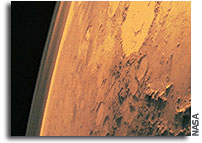The role of impact and radiogenic heating in the early thermal evolution of Mars

S. Sahijpal, G. K. Bhatia
(Submitted on 14 Aug 2014)
The planetary differentiation models of Mars are proposed that take into account core-mantle and core-mantle-crust differentiation. The numerical simulations are presented for the early thermal evolution of Mars spanning up to the initial 25 million years (Ma) of the early solar system, probably for the first time, by taking into account the radiogenic heating due to the short-lived nuclides, 26Al and 60Fe.
The influence of impact heating during the accretion of Mars is also incorporated in the simulations. The early accretion of Mars would necessitate a substantial role played by the short-lived nuclides in its heating. 26Al along with impact heating could have provided sufficient thermal energy to the entire body to substantially melt and trigger planetary scale differentiation. This is contrary to the thermal models based exclusively on the impact heating that could not produce widespread melting and planetary differentiation. The early onset of the accretion of Mars perhaps within the initial ~1.5 Ma in the early solar system could have resulted in substantial differentiation of Mars provide it accreted over the timescale of ~1 Ma. This seems to be consistent with the chronological records of the Martian meteorites.
Comments:
37 pages, 8 figures (Under revision)
Subjects:
Earth and Planetary Astrophysics (astro-ph.EP); Solar and Stellar Astrophysics (astro-ph.SR)
Cite as:
arXiv:1408.3341 [astro-ph.EP] (or arXiv:1408.3341v1 [astro-ph.EP] for this version)
Submission history
From: Sandeep Sahijpal
[v1] Thu, 14 Aug 2014 16:54:51 GMT (1738kb)









